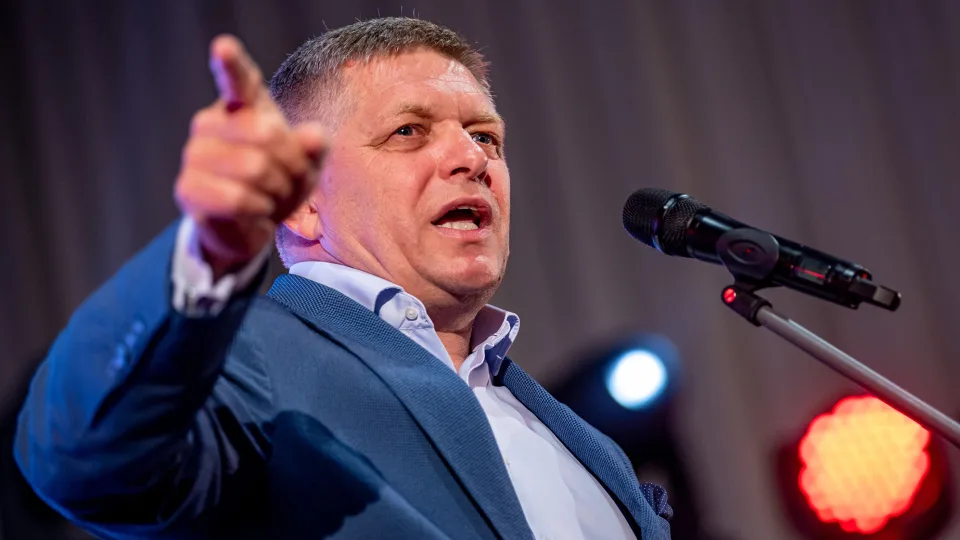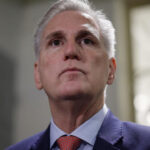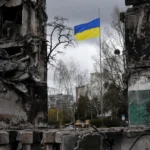
Former Slovak Prime Minister Robert Fico has called for stopping military aid to neighboring Ukraine.
Slovakia’s Upcoming Election Sparks Concern in the West
Slovakia is on the brink of electing its fifth prime minister within four years. With Robert Fico, known for his Kremlin leanings, leading in the polls with his opposition party, the Western world is closely observing with rising apprehension.
Slovakia’s Staunch Support for Ukraine
Since Russia’s invasion of Ukraine in the previous February, Slovakia has stood out as one of Kyiv’s most unwavering allies. Sharing a border with Ukraine, Slovakia was the initial country to offer air defense support and warmly received tens of thousands of fleeing refugees.
Fico’s Pro-Kremlin Stance
However, if Fico claims power, there’s a potential shift on the horizon. As a former prime minister, Fico openly expresses his alignment with Kremlin ideologies. He controversially placed blame on “Ukrainian Nazis and fascists” for goading Russia’s President Vladimir Putin into initiating the invasion, echoing Putin’s own misleading justification for his aggressive actions.
Furthermore, Fico has voiced his desire for the Slovak government to halt its arms supply to Kyiv. He has openly stated that under his leadership, Slovakia would discontinue its ammunition support. Additionally, he stands against Ukraine’s aspirations to join NATO.
Mesežnikov’s Analysis on Fico’s “Peace” Agenda
Grigorij Mesežnikov, a distinguished political analyst and the head of the Institute of Public Affairs in Slovakia, shares his insights on Fico’s position. He observes that, similar to many Russia sympathizers, Fico packages his Moscow support as a campaign for “peace.”
Drawing from Mesežnikov’s analysis, Fico and his allies are against supplying arms to Ukraine with the belief that it prolongs the war. Their stance is that peace would prevail faster if support to Ukraine ceased. Mesežnikov, however, interprets this not as a genuine “pro-peace” stance but rather as “pro-Russian.”
Fico’s Past Tenure as Prime Minister
Robert Fico is no newcomer to the role of prime minister, having led Slovakia for over a decade across two distinct periods: initially between 2006-2010 and later from 2012-2018.
His previous term ended in resignation in 2018, following a surge of public protests ignited by the tragic assassination of investigative journalist Jan Kuciak and his fiancée, Martina Kušnírová. Kuciak’s investigative work had exposed corruption within Slovakia’s elite circles, revealing connections to Fico and his affiliated political party, SMER.
Shift in Voter Preference
Post the tumultuous reign of SMER, the 2020 election witnessed a pivot in voter sentiment. The center-right faction, Ordinary People and Independent Personalities (OLaNO), emerged victorious.
Initial Optimism Around OLaNO
OLaNO, under the leadership of Igor Matovič, was initially hailed as a much-needed revitalizing force in Slovak politics. Matovič, a self-made affluent individual, secured his win leveraging a robust anti-corruption narrative, pledging a comprehensive cleansing of Slovakia’s political landscape.
Challenges to Matovič’s Integrity
However, Matovič’s integrity as an anti-corruption crusader faced early challenges. In a significant blow to his reputation, he was compelled to acknowledge that he had plagiarized sections of his master’s thesis. Additionally, his governance was marred by persistent internal discord and disputes.
Matovič’s Controversial Decision Leads to Resignation
Matovič faced a swift end to his tenure, a result of his autonomous decision to procure Covid-19 vaccines from Russia. This move sparked significant dissent within his coalition, eventually forcing him to relinquish his position just after a year.
Leadership Shuffle Amidst Political Chaos
In a bid for stability, Matovič swapped roles with Finance Minister Eduard Heger. But the upheaval persisted. With Slovakia grappling with the repercussions of both the pandemic and Russia’s aggressive actions in Ukraine, internal disputes intensified.
Governing Coalition’s Downfall
The persistent disagreements and personal clashes culminated in the disintegration of the ruling coalition by December. Although Heger took over as an interim prime minister, his stint was short-lived. By May, he too stepped down, paving the way for technocrat Ludovit Odor to assume leadership.

duard Heger, pictured in Tallinn, Estonia, in November 2022, resigned as caretaker prime minister in May.
Fico’s Resurgence in Politics
Recent political tumult has granted Robert Fico an opportunity for political rejuvenation. Mesežnikov, the political analyst, notes that despite facing near oblivion post the last election, Fico has managed to resurge, now being a leading contender. While SMER retains its core voter base, largely attributed to Fico, it has also benefited from governmental conflicts and external challenges like Covid, inflation, the energy crisis, and Ukraine’s conflict.
Slovakia’s Electoral Dynamics
Slovakia’s intricate electoral system and the myriad of political factions pose a challenge for a majority rule. With around 10 political groups potentially surpassing the 5% threshold to gain parliamentary entry, Fico’s potential victory would likely necessitate a coalition. Notably, Fico hasn’t negated a coalition with Republika, a far-right party with contentious views on Ukraine.
Disinformation’s Stronghold in Slovakia
Persistent governmental conflicts and corruption incidents have eroded public trust, paving the way for misinformation and propaganda. Last month’s incident, where Slovak police charged top security officials, including the spy chief, with conspiracy, was termed a “police coup” by Fico. Alarmingly, a GlobSec survey revealed Slovakia’s susceptibility to skewed narratives. Mere 40% of Slovaks attributed Ukraine’s war to Russia, with a startling 50% viewing the U.S. as a security threat.
Slovakia’s Unique Vulnerability to Russian Propaganda
Dominika Hajdu from GlobSec underscores Slovakia’s distinct susceptibility to Russian propaganda. Many leading political factions echo narratives aligned with pro-Russian propaganda. Historically, pan-Slavic narratives depicted Russia as Slovakia’s protector, further complicating the scenario.
Slovakia’s Historical Context with Hungary
Hungary and Slovakia’s intertwined history, tracing back to the Austro-Hungarian empire, continues to fuel nationalistic fervor. The 1920 Trianon Treaty’s ramifications linger, causing nationalistic outbursts on both sides.
Russia’s Focus on Slovakia & The Divisive Election
Věra Jourová, from the European Commission, identifies the upcoming election as a litmus test for gauging the effectiveness of social media in curbing Russian propaganda in Slovakia. With Slovakia being a primary target for Russian narratives, Mesežnikov believes that the current government’s unwavering support for Ukraine has sparked fatigue among Slovaks. This sentiment has been capitalized on by SMER and Republika.
Slovakia’s Aid to Ukraine and SMER’s Opposition
Mesežnikov elaborates on Slovakia’s commendable support to Ukraine, from proposing sanctions on Russia to sending defense equipment. The nation also welcomed a significant number of Ukrainian refugees. However, parties like SMER and Republika appeal to a segment of Slovaks opposing such aid, contending it burdens Slovakia’s resources. But as Mesežnikov counters, much of this aid is underpinned by the European Union’s financial backing.


